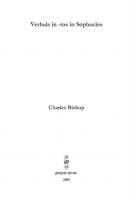Theatre in Crisis: Sophocles' Reconstruction of Genre and Politics in "Philoctetes" 9025608361, 9789025608361
203 4 26MB
English Pages 436 [126] Year 1987
Recommend Papers

- Author / Uploaded
- Carola Greengard
File loading please wait...
Citation preview
THEATRE
IN CRISIS
Sophocles’ Reconstruction of Genre and Politics in
Philoctetes
by Carola Greengard
PA 4413
PS G74 1987
Ny
ADOLF M. HAKKERT - PUBLISHER - AMSTERDAM 1987
Digitized by the Internet Archive in 2019 with funding from
Kahle/Austin Foundation
https://archive.org/details/theatreincrisissO000gree
for Viktor,
Helen
and
Howard
Nvpqais Ghiavow émevEapevor yOotov owtijeas ixéo8a.
en
xiao a ineunh ae
’
ares
ee
THEATRE
IN CRISIS
Sophocles’ Reconstruction of Genre and Politics in
Philoctetes
by Carola Greengard
Ma ADOLF M. HAKKERT
- PUBLISHER - AMSTERDAM 1987 nt
ISBN 90 - 256 - 0836 - 1
The Philoctetes is less well known by far, to academic readers as well as others, than Sophocles’ Oedipus plays. Even so, there are contemporary readers who find the play’s issues and images arresting enough to afford it regular performance. As a college student I was moved by the image of the archetypically heroic Philoctetes standing defiant, refusing engagement with a world peopled by corrupt politicians and governed by “political necessity”. The impasse built into this work’s dramatic structure has continued to fascinate me as a kind of strange theatrical event
from both a formal and historical point of view. The problems addressed in the present study are general ones and those that have quickened my own curiosity and enjoyment of the play. My wish has been to enhance the knowledge and pleasure of non-Classicist scholars and readers while also providing enough new material of exegesis to be of interest to Classicist students of ancient drama. To this end I have abbreviated discussions that require an extensive familiarity with philological materials and have tried to formulate the issues of scholarly concern in language accessible to readers outside the field. Footnotes and references have been limited primarily to works available in English, and sources less frequently cited in philological treatises, for instance, the materials of vase painting or cult, are included. For those who wish to be oriented at the outset to the author’s point of view, my own bias on Sophocles, implicit throughout this manuscript, is that he was a conscientiously political author, neither dispassionate nor given to the sort of dramatic alienation that is conventional in our own theatres. In this I depart from the canonical view. For example, the Oxford Classical Dictionary accords Sophocles the distinction of being the one truly apolitical
|
tragedian. “In Sophocles, indeed, there is little discernible allu-
sion to contemporary issues, and he keeps wholly within the limits
of his heroic
plot”
(OCD
Trag.
11).
I find
such
statements
puzzling and perhaps best understood. as anachronistic projection. Any reading or viewing of Philoctetes is enriched and
clarified by taking at face value the political preoccupations of the text.
I find also that in Philoctetes, cult and religious ideology represent a special case of the drama’s allusion to and intrusion into contemporary realities. Both were open to revision by appropriate authorities, of whom Sophocles himself was one. Sophocles’ assumption of direct influence over his audience, his power to enlighten and convert, serves as a mainspring for the restructuring of both political attitude and literary genre that the
playwright has here attempted. The standard pietist reading of
Sophoclean tragedy, having more to do with nostalgia for the comfortable Christianity of Victorian readers than with elucidation of Sophoclean texts, has been particularly problematic for Philoctetes and has done much to subvert its sense. For my own part, I find that political, religious and theatrical ideology are inseparable strands in Sophoclean drama, and I have been particularly interested in this play to explore the ways in which Sophocles has, through need or desire, elaborately confounded tragic and comic genres to create a novel dramatic pattern responsive to the highly specific experiences of war and revolution that were reshaping the Athenian state at the end of the fifth century.
That, in fact, is the substance of this book’s argument.
This manuscript was completed several years before publication and the citations precede 1980. I will additionally cite here three books of more recent date that include useful and current bibliographies on philological and classical criticism of Philoctetes. R.P. Winnington-Ingram, Sophocles: an interpretation (Cambridge and NY 1980) follows in the tradition of character analysis and explores Sophocles’ tragic vision. Charles Segal, Tragedy and Civilization: an interpretation of Sophocles (Cambridge, Massachusetts 1981) incorporates current anthropological theories. J.C. Kamerbeek, The Plays of Sophocles: commentar-
ies, Part VI The Philoctetes (Leiden 1980) is the first new commentary for this play in many years.
I would like to name in thanks Helen Bacon, Bill Oram, Thalia Pandiri and Seth Schein for many enjoyable and fruitful conversations, and arguments, over this play and my manuscript.
Carola Greengard New York City 1983
ve
:
4 tpl
mo
sty a
ee
4 aha









